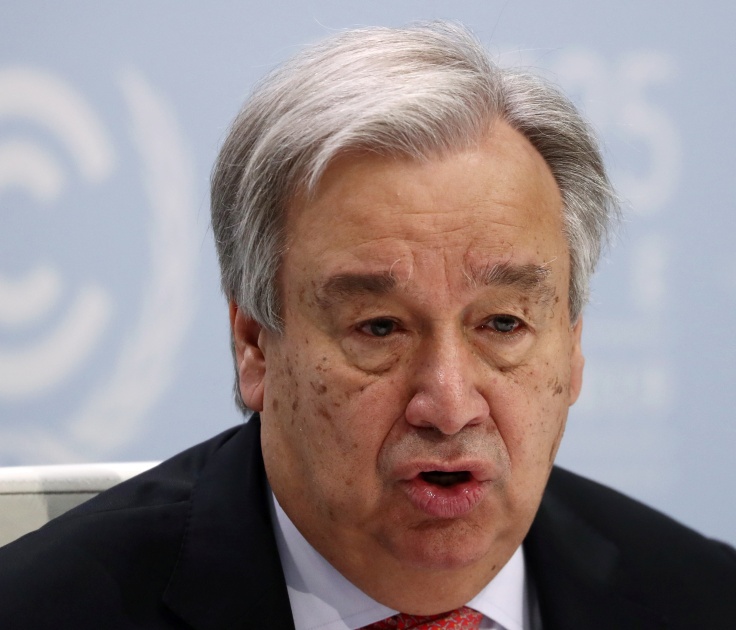As #COP25 opens in Madrid Oliver Balch reports on a boost in firms signing up to Science Based Targets and research on how 2020 goals have fallen short
There is only one thing on the mind of delegates gathered in Madrid this week for the United Nations' annual climate summit: how to keep global temperature rises within 2C or below, as envisioned by the 2015 Paris Agreement.
António Guterres, UN secretary-general, opened the conference warning that “life itself” was at risk if the world’s biggest polluters do not phase out fossil fuels.
The scale of the challenge was underlined by new research from the Global Carbon Project, which projected that fossil fuel emissions will grow 0.6% this year, and “peak CO2 emissions could remain decades away”.
With coal use declining in the US and EU, the 2019 increase is almost entirely due to China, where increased steel and cement production is expected to push up emissions by 2.6%.
At the start of the conference, 75 CEOs joined with the head of the AFL-CIO, which represents 12.5 million American workers, to issue a statement asking for President Donald Trump to rescind his decision to pull the US out of the Paris Agreement.

In the statement, which former Unilever boss Paul Polman described as “historical”, the CEOs argued: "Staying in the Paris Agreement will strengthen our competitiveness in global markets, positioning the United States to lead the deployment of new technologies that support the transition, provide for our workers and communities, and create jobs and companies built to last."
Signatories include the CEOs of Royal Dutch Shell, Total, Apple, Google and Goldman Sachs.
According to the We Mean Business (WMB) coalition, over 600 international companies have now pledged to cut CO2 emissions aligned with achieving the Paris goals through the science-based emission initiative. Of these, 285 have had their commitments externally validated in line with WMB’s criteria. This more exacting list includes companies such as Nestlé, Microsoft, Nike and McDonald’s, which have operations with huge global footprints.
The listing also includes 76 corporations that have set their sights on a 1.5C trajectory. WMB calculates that the emissions collectively saved (if the pledges are successful) will be more than the current greenhouse gas output of France and Spain combined. The business coalition also estimates that up to $18bn could be generated for climate change mitigation through the moves, plus enough new renewable energy capacity to meet the electricity demands of 11m US households for one year.
Notably, however, early running is dominated by companies headquartered in high-income countries, with only 6% of the firms with validated targets based outside the OECD. Meanwhile, Japan recently become the first government to announce public-sector support for companies setting science-based targets. The goal of the world’s largest economy is for 100 Japanese approved targets by 2020. At present, it counts 52.
Now in its 25th year, the UN’s annual Conference of the Parties (COP) has become a popular platform for companies to make ambitious climate-related pledges. One of the most ambitious came from Inter IKEA Group, the parent group of Swedish furniture retailer IKEA, with a €200m plan to become carbon neutral by 2030 (primarily through investment in renewable energies and tree planting).

There were also reports in the run-up to the Madrid conference highlighting the private sector’s somewhat patchy record for setting tough targets and then missing them. Such is the case with deforestation pledges made by the influential Consumer Goods Forum, for example. Recently published research from disclosure specialist CDP found that only three companies achieved 100% deforestation-free certification in palm oil, and just one in timber. (See Consumer groups are failing to see the woods for the trees)
This is despite a 2010 resolution by the forum’s members to reduce deforestation impacts of their supply chains to net zero, a goal that leading companies such as Nestlé and Procter & Gamble have now admitted will not be possible. Regarding deforestation linked to palm oil, just under one fifth of the 96 companies submitting relevant data to CDP admit they will fall short of 2020 goals to source certified goods or establish traceability mechanisms.
A new report out this week from online ethical retailer A Good Company also gives cause for caution. According to research by the Swedish firm, only 6% of the strategic goals published by Fortune 500 companies relate to sustainability or climate change. Indeed, 411 of the companies fail even to mention climate in their strategy declarations. Describing the findings as evidence of the “same old, same old”, the report identifies the terms “customer” (mentioned in 191 strategic priorities), “growth” (137) and “innovate” (102) as predominant. That said, 30 corporations, including GM, Alcoa and International Paper, are found to focus at least 25% of their strategic priorities to tackling climate. The average timeline for climate targets is 2023 (compared to the average for all targets of 2021).
Eyes in Madrid are also turned to the finance sector as a potential engine of climate action. Such optimism is fuelled by the announcement back in September by a coalition of 33 major banks (including BBVA, ING, BNP Paribas and Santander) to align their portfolio in accordance with the Paris Agreement. Patience may be required, however. According to a recent study of the world’s 15 largest finance firms, for example, a significant gap (calculated at between 16-21%) exists between the financiers’ portfolios and a 2C pathway. The report, published by the London-based community interest company InfluenceMap, also finds that “only a portion” of these investment giants are meaningfully engaging with companies on the uptake of low carbon technologies or on their climate policy lobbying. Collectively, InfluenceMap concludes that the elite investor group, which together hold more than $37tn in assets under management, are “at odds with the rapid transition to a low-carbon economy”.
The findings reinforce recent research by the World Resources Institute that reveals fewer than half (46%) of the world’s largest 50 banks have public sustainable finance targets. Similarly, a new report from US impact investor Boston Common Asset Management reveals that fewer than one third (29%) of the 58 major banks that it contacted have risk assessment procedures or sector-level criteria in line with a 1.5C or 2C pathway. Moreover, only 16% of the banks studied exclude clients involved in deforestation and 40% still have not developed exclusion or restriction policies for high-carbon sectors. The report also notes that financing for fossil fuels continues to rise each year, totalling $1.9tn from 2016-2018.
Divestment: too little, too late?

“The action or process of selling off subsidiary business interests or investments.” An increasing number of investors have had cause to consult the Oxford English Dictionary definition of “divestment” in recent weeks. BNP Paribas is the latest international financier to bend to pressure to pull out of fossil fuels. The French bank has said it will desist from coal investments across Europe by 2030 and globally by 2040.
The commitment is in line with its promise to invest €3bn in renewable energy between now and 2021. The move follows similar recent pledges by insurance giants, AXA, Allianz and AXIS. According to campaign group Unfriend Coal, reinsurers controlling 45% of the non-life market have now adopted coal exit policies. One of the most significant financial institutions to get in on the divestment act is the European Investment Bank, which has announced it is to pull out of fossil fuel projects entirely by the end of 2021. The divestment movement comes at a difficult time for coal-fired electricity, which is set to drop by 3% this year, as India’s reliance on coal power falls and demand in China plateaus.
But is it too little, too late? According to a comment piece in the latest issue of the journal Nature, the planet may already have crossed key climate tipping points. According to the latest evidence, an increase of 1C to 2C in global temperatures could be enough to push the planet into an unstoppable path towards runaway climate change. This is far less than the 5C previously predicted.
The latest figures from the World Meteorological Organization (WMO) make grim reading as well. Data in the WMO Greenhouse Gas Bulletin reveal that concentrations of carbon dioxide reached 407.8 parts per million in 2018, up from 405.5 parts per million (ppm) in 2017. Since 1990, the warming effect of greenhouse gases on the climate (known as “total radiative forcing”) has increased by over two-fifths (43%). Of this, CO2 accounts for about four-fifths (80%). The last time the planet experienced high concentrations of CO2 was three to five million years ago – a time when sea levels were 10 to 20 meters higher than at present. A new report by Climate Transparency, a network of research organisations, arrives at a similarly worrying conclusion. Unless radical steps are taken, the authors predict, G20 countries will exhaust their remaining carbon budget (the limit to remaining below a 1.5C rise) of 420 gigatonnes of CO2 by 2028.

The fault, in no small part, lies with an unyielding attachment by the energy sector to fossil fuels. Research by the independent think-tank Carbon Tracker finds that none of the world’s major oil and gas companies is on track to meet targets set by the Paris Agreement by 2040. US oil giant ConocoPhillips is furthest off the mark, with production cuts of oil and gas in the region of 85% if it is to stand a hope of compliance. Meanwhile, ExxonMobil, Eni and Chevron require reductions of 55%, 40% and 35%, respectively.
According to an analysis by the UN Environment Programme, the extraction of coal, oil and gas is set to be 50% more than the amount that can be burned if global temperatures are to stay within a 2C rise come 2030. Within a 1.5C scenario, the proportion becomes more than double (120%). Notable exceptions include Belize, Costa Rica, France, Denmark, and New Zealand, all of which have enacted a partial or total ban or moratoria on oil and gas extraction. Partial succour is also offered by the UK government, which reports that the greenhouse gas intensity of the country’s energy supply industry fell by 69% between 1990 to 2018, a move largely explained by the uptake of renewables. Despite this, the UK energy sector remains the nation’s highest emitting industry, just ahead of the manufacturing and transport sectors.

